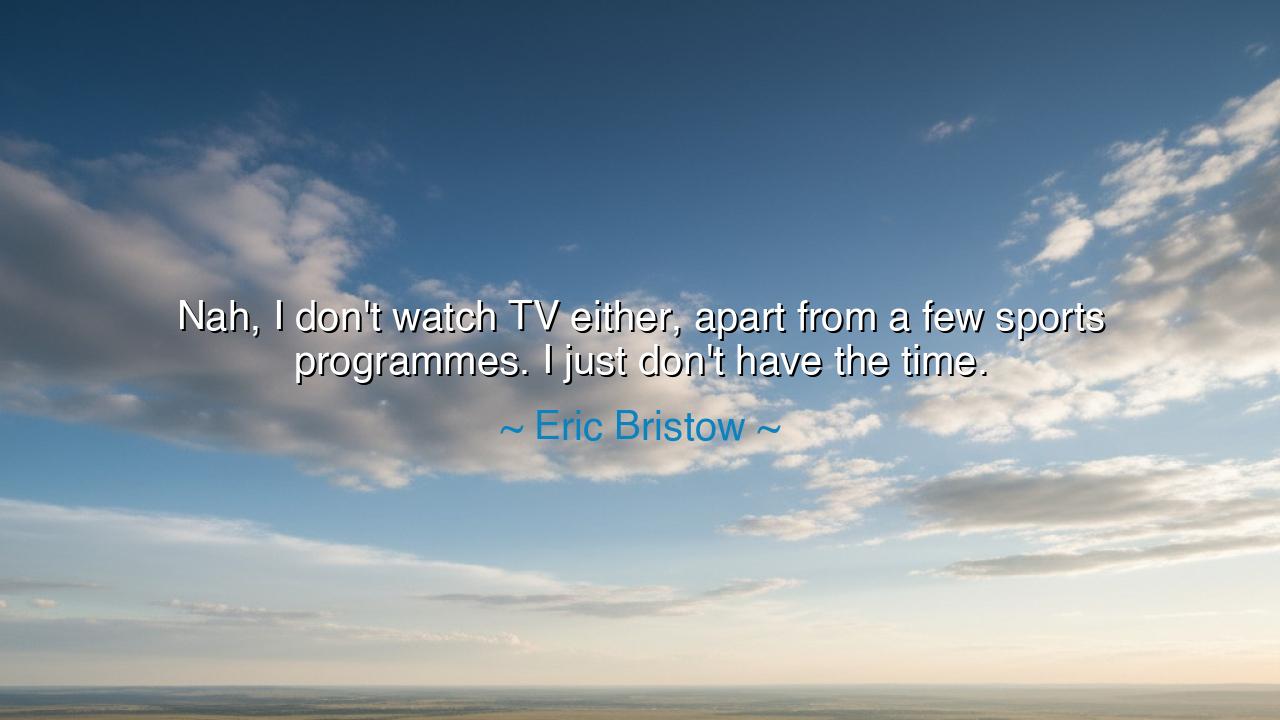
Nah, I don't watch TV either, apart from a few sports
Nah, I don't watch TV either, apart from a few sports programmes. I just don't have the time.






From the lips of Eric Bristow, master of the dartboard and champion of discipline, comes a saying clothed in plainness yet rich in wisdom: “Nah, I don’t watch TV either, apart from a few sports programmes. I just don’t have the time.” To the untrained ear, these words seem casual, the offhand remark of a man too busy for leisure. Yet beneath their simplicity lies a teaching as sharp as the dart he hurled with such unerring precision: the measure of greatness is not how one fills their hours with distractions, but how one guards their time for the pursuit of mastery.
When Bristow says, “I just don’t have the time,” he speaks the truth of all who have risen above mediocrity. Time is the most fleeting of treasures, and once squandered, it cannot be reclaimed. He knew that every hour before a screen was an hour stolen from the board, from practice, from honing the hand and steadying the eye. This is not condemnation of rest or recreation, but a reminder that what we love, we must give our time to. For no champion is forged in idleness; all greatness is born from hours of devotion unseen by the crowd.
The reference to “a few sports programmes” carries its own subtle wisdom. For Bristow did not wholly turn his face from television—he allowed himself glimpses of the games that stirred his spirit, contests of skill that mirrored his own struggle. He fed on them not as passive indulgence but as nourishment, taking inspiration from the triumphs and defeats of others. This reveals the balance: even the devoted must sometimes refresh the mind with visions that kindle, rather than dull, the fire within.
Consider the tale of Thomas Edison, who was once asked why he worked such long hours without leisure. He replied, “I never did a day’s work in my life. It was all fun.” Like Bristow, Edison gave his time not to idle pursuits but to the labor that defined him. To others, his refusal of distractions seemed sacrifice, but to him, it was joy, for he loved his craft. So too with Bristow: the dartboard was not merely work, it was his realm, his passion, the altar where he gave his hours and received greatness in return.
There is, in Bristow’s words, also the scent of priority. He reminds us that life is a battlefield of choices. To rise in one field, we must accept that other pleasures may be denied us. The ordinary man may sit long before the glowing screen, but the extraordinary man counts the cost of his hours and invests them in the pursuit of a higher aim. This is not asceticism for its own sake, but clarity: he saw what mattered most and gave himself to it without regret.
From this, let us learn: if you would achieve excellence in any art, sport, or calling, be ruthless with your time. Guard it as a king guards his crown. Do not despise leisure, but choose it wisely, in ways that renew rather than diminish you. Ask each day: Is this use of time drawing me closer to my goal, or pulling me away from it? In the answer lies the shape of your destiny.
The practical path is clear. Limit distractions that drain your spirit. Let your leisure be chosen with care, and let your work be pursued with devotion. Make time not your master, but your servant, shaping each day toward the excellence you seek. For in the end, as Bristow teaches, greatness is not found in what we watch, but in what we do.
Thus the teaching endures: the true champion does not waste the hours given to him, but invests them in the work that defines his life. Leave behind distractions, embrace the discipline of focus, and like Bristow, you may find that the time you claim for your passion becomes the very measure of your greatness.






AAdministratorAdministrator
Welcome, honored guests. Please leave a comment, we will respond soon